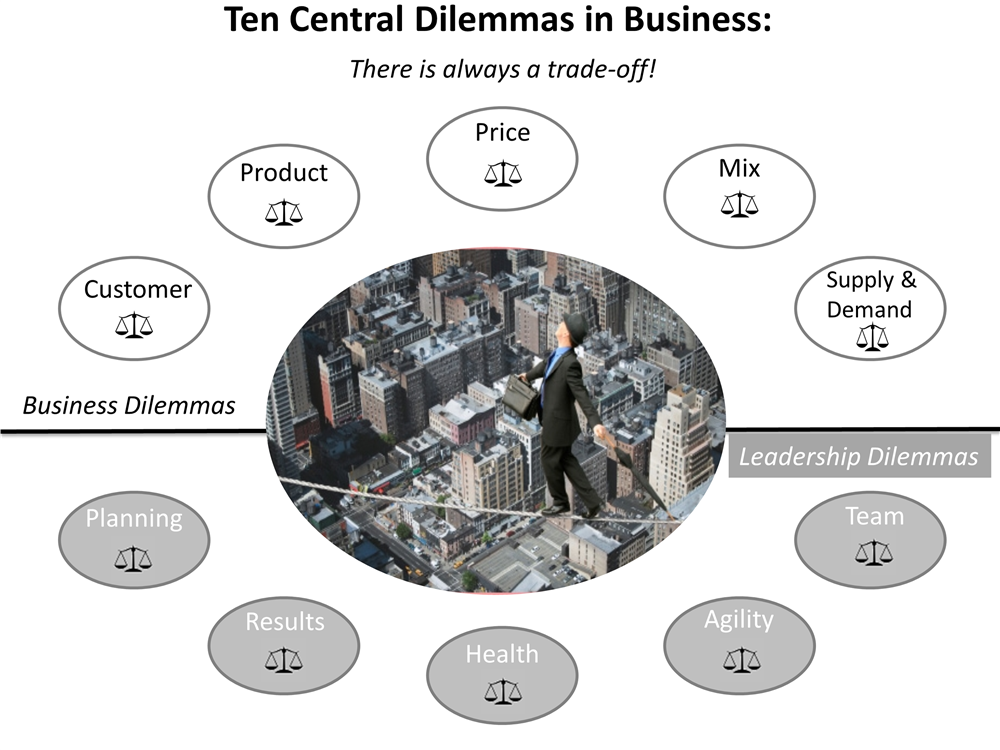
By Ken Thompson July 2017
Over the last 10 years I have had the privilege of working closely with top performers in major enterprises to design business simulations and business games to exactly match their organizational learning needs.
My discussions mostly concentrated on the key things which top performers did differently than others in their organizations to achieve their results: I call this approach Dilemma-based Design. DbD is an amazingly powerful technique to quickly discover the 3-4 most important aspects of any job or function.
A dilemma is a values conflict requiring a choice. It usually requires some kind of trade-off between two (or more) things which you would like to protect or achieve. The difference between a dilemma and a decision is that there is always some pain or loss in a dilemma at the point of decision-making.
As these conversations developed I became increasingly aware that despite the amazing diversity of these businesses and the individuals who excelled in them there seemed to be a common theme.
I made two amazing discoveries about business dilemmas:
Firstly top performers welcome dilemmas and use them as platforms to excel.
Let me be more specific – when faced with a dilemma a top performer usually reject the obvious responses for something a bit more thoughtful, entrepreneurial and creative.
Secondly the same dilemmas keep re-occurring in every enterprise.
Below I have summarised the 10 dilemmas which come up constantly irrespective of the type of enterprise.
The first 5 dilemmas are Business Dilemmas which mostly concern the operation of the whole business unit whereas the last 5 dilemmas are Leadership Dilemmas which mostly concern the operation of the executive team leading the business unit.
1. The Customer Dilemma is primarily about how we decide which customers (or prospective customers) are most important at which times and how we might win their loyalty.
2. The Product Dilemma is essentially about how we optimize the contributions of our whole portfolio of product across their full lifetimes and how/when old products get retired and new products introduced.
3. The Price Dilemma concerns how we use pricing to optimize the ‘trinity’ of profit, demand, and market share in different market conditions and how we price to support products appropriate to their potential and maturities.
4. The Mix Dilemma is fundamentally about how we mix (i.e. optimize) the different options available to us in terms of products, markets and other factors (such as supply, geography and currency) to produce the best business results at the lowest business risk.
5. The Supply & Demand Dilemma is primarily about how we strike a balance between having too much supply of our product (or its components) and having too little to satisfy our customer’s demand and how we achieve this in the most profitable manner.
6. The Planning Dilemma is essentially about getting the right balance between developing comprehensive plans and mobilizing plans through conversations. It is also about how we avoid the artefacts of planning becoming ends in themselves.
7. The Results Dilemma concerns how we design and effectively monitor a balanced set of measures which keep our’ eyes on the prize’ while providing us with effective tracking and early warning systems.
8. The Health Dilemma is primarily about how we strike a balance between delivering the required results today while protecting and enhancing the ability of our organization to deliver the results it needs in the future.
9. The Agility Dilemma is about our ability to respond effectively to and learn from all types of unexpected change both minor and major. It is also about how we design systems to warn of, build resilience to and respond to future shocks, so that if they cannot be avoided or absorbed at least we can manage them with less pain.
10. The Team Dilemma is how we balance the tensions between being an effective, autonomous and motivating leader with being a supportive and loyal member of a senior team.
You are going to encounter all these dilemmas sooner or later so why not study and practise them now to accelerate your business acumen and commercial acumen skills?
A great way to experience the dilemmas is through a powerful team-based business simulation game, such as XSim, which allows teams of leaders to immerse themselves in the dilemmas to become better equiped to handle them in real life.
I explore the ten dilemmas and the creative dilemma resolution process used by top perforers issues in much more detail in my book A Systematic Guide to Business Acumen and Leadership using Dilemmas